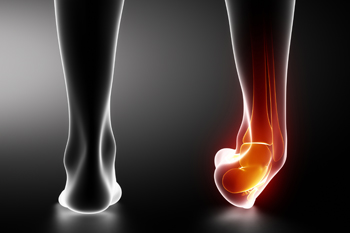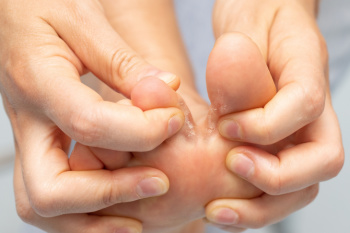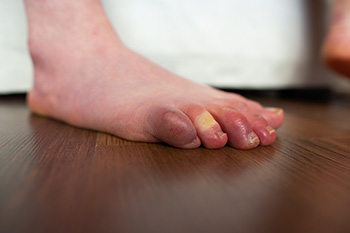Connect With Us
Blog

Foot fractures can sometimes be mistaken for ankle sprains because both injuries cause pain, swelling, and difficulty walking. A fracture happens when a bone in the foot breaks, either from a sudden injury or repeated stress over time. An ankle sprain, on the other hand, involves stretched or torn ligaments. Since the symptoms can look very similar, it is easy to miss a fracture without proper evaluation. A podiatrist will ask how the injury happened and examine the foot for tenderness, bruising, and movement issues. Imaging tests like X-rays are usually needed to confirm whether a bone is broken. Missing a fracture can lead to delayed healing, ongoing pain, or long-term foot problems. If you have an injury that is not improving as expected, or the pain seems worse than a typical sprain, it is suggested that you see a podiatrist for an accurate diagnosis and appropriate treatment.
Broken ankles need immediate treatment. If you are seeking treatment, contact Joan Oloff, DPM from Los Gatos Foot and Ankle . Our doctor can provide the care you need to keep you pain-free and on your feet.
Broken Ankles
A broken ankle is experienced when a person fractures their tibia or fibula in the lower leg and ankle area. Both of these bones are attached at the bottom of the leg and combine to form what we know to be our ankle.
When a physician is referring to a break of the ankle, he or she is usually referring to a break in the area where the tibia and fibula are joined to create our ankle joint. Ankles are more prone to fractures because the ankle is an area that suffers a lot of pressure and stress. There are some obvious signs when a person experiences a fractured ankle, and the following symptoms may be present.
Symptoms of a Fractured Ankle
- Excessive pain when the area is touched or when any pressure is placed on the ankle
- Swelling around the area
- Bruising of the area
- Area appears to be deformed
If you suspect an ankle fracture, it is recommended to seek treatment as soon as possible. The sooner you have your podiatrist diagnose the fracture, the quicker you’ll be on the way towards recovery.
If you have any questions, please feel free to contact our office located in Los Gatos, CA . We offer the newest diagnostic and treatment technologies for all your foot care needs.

Athlete’s foot is a common fungal infection that causes discomfort and irritation, typically between the toes. This condition is caused by fungi called dermatophytes, which thrive in warm, moist environments like sweaty shoes and socks. If you have athlete's foot, you may experience intense itching, redness, peeling, and in some cases, blisters or cracks. The feeling can be persistent and frustrating, making it difficult to wear shoes or walk comfortably. There are different types of athlete’s foot. Interdigital athlete's foot affects the space between the toes, while the moccasin type causes dry, scaly patches on the soles and sides of the feet. The infection can easily recur if not treated properly, as the fungi can survive on surfaces like towels, shoes, or floors. Poor hygiene and tight shoes can also contribute. If you are dealing with recurring athlete’s foot, it is suggested that you make an appointment with a podiatrist who can provide effective treatments, including prescribed antifungal medications.
Athlete’s foot is an inconvenient condition that can be easily reduced with the proper treatment. If you have any concerns about your feet and ankles, contact Joan Oloff, DPM from Los Gatos Foot and Ankle . Our doctor will treat your foot and ankle needs.
Athlete’s Foot: The Sole Story
Athlete's foot, also known as tinea pedis, can be an extremely contagious foot infection. It is commonly contracted in public changing areas and bathrooms, dormitory style living quarters, around locker rooms and public swimming pools, or anywhere your feet often come into contact with other people.
Solutions to Combat Athlete’s Foot
- Hydrate your feet by using lotion
- Exfoliate
- Buff off nails
- Use of anti-fungal products
- Examine your feet and visit your doctor if any suspicious blisters or cuts develop
Athlete’s foot can cause many irritating symptoms such as dry and flaking skin, itching, and redness. Some more severe symptoms can include bleeding and cracked skin, intense itching and burning, and even pain when walking. In the worst cases, Athlete’s foot can cause blistering as well. Speak to your podiatrist for a better understanding of the different causes of Athlete’s foot, as well as help in determining which treatment options are best for you.
If you have any questions please feel free to contact our office located in Los Gatos, CA . We offer the newest diagnostic and treatment technologies for all your foot and ankle needs.

Raynaud's phenomenon is a condition that affects blood flow to certain areas of the body, most commonly the fingers and toes. It occurs when small blood vessels narrow in response to cold temperatures or stress, limiting circulation to the affected areas. This can cause the feet to feel cold, numb, or painful, and they may change color from white to blue before returning to normal. The exact cause of Raynaud's phenomenon is not always clear, but it is often linked to autoimmune conditions, vascular disorders, or prolonged exposure to cold environments. Managing symptoms includes keeping the feet warm, avoiding triggers, and improving circulation through exercise and stress management. If you have any of the above symptoms, it is suggested that you visit a podiatrist who can accurately diagnose the problem, and offer effective relief methods.
Foot Pain
Foot pain can be extremely painful and debilitating. If you have a foot pain, consult with Joan Oloff, DPM from Los Gatos Foot and Ankle . Our doctor will assess your condition and provide you with quality foot and ankle treatment.
Causes
Foot pain is a very broad condition that could be caused by one or more ailments. The most common include:
- Bunions
- Hammertoes
- Plantar Fasciitis
- Bone Spurs
- Corns
- Tarsal Tunnel Syndrome
- Ingrown Toenails
- Arthritis (such as Gout, Rheumatoid, and Osteoarthritis)
- Flat Feet
- Injury (from stress fractures, broken toe, foot, ankle, Achilles tendon ruptures, and sprains)
- And more
Diagnosis
To figure out the cause of foot pain, podiatrists utilize several different methods. This can range from simple visual inspections and sensation tests to X-rays and MRI scans. Prior medical history, family medical history, and any recent physical traumatic events will all be taken into consideration for a proper diagnosis.
Treatment
Treatment depends upon the cause of the foot pain. Whether it is resting, staying off the foot, or having surgery; podiatrists have a number of treatment options available for foot pain.
If you have any questions, please feel free to contact our office located in Los Gatos, CA . We offer the newest diagnostic and treatment technologies for all your foot care needs.

